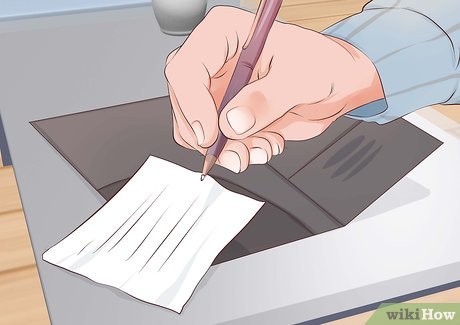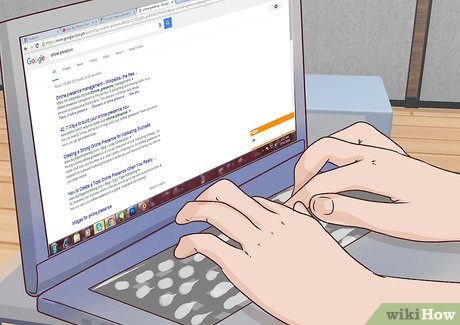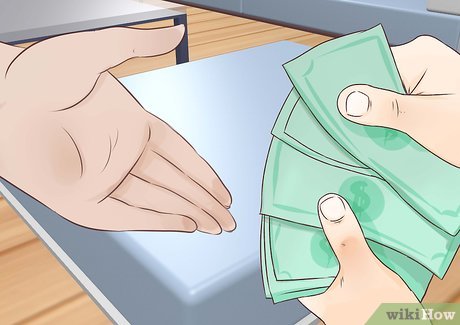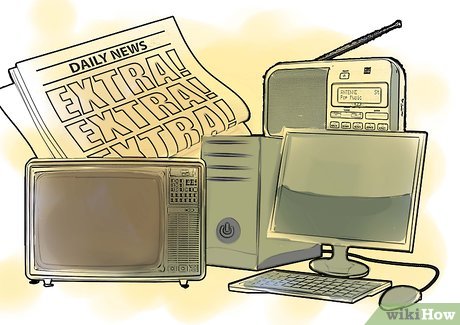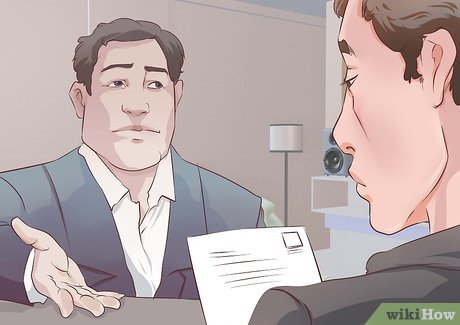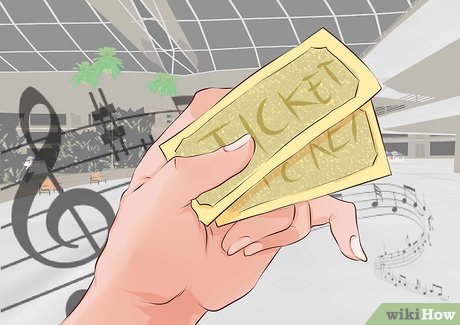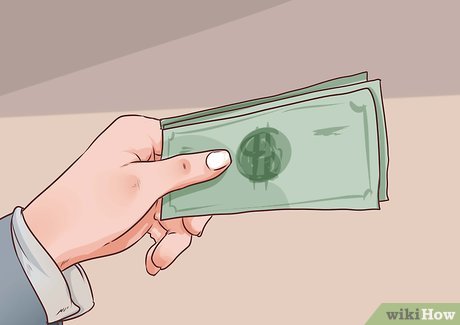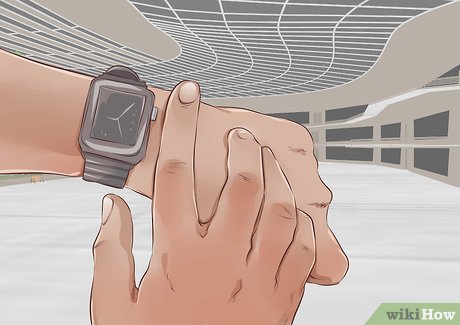How to Create a Benefit Concert Series
Part 1 of 3:
Planning Your Concerts
-
 Find a cause that you are passionate about. You won't be able to put in the required work or inspire others to help you if you don't fully believe in what you are doing.
Find a cause that you are passionate about. You won't be able to put in the required work or inspire others to help you if you don't fully believe in what you are doing. -
 Build a team of like-minded people. Realize that you can't do this on your own. It's not necessary to build a large team, but you'll need at least a few more people who share your enthusiasm for the cause.
Build a team of like-minded people. Realize that you can't do this on your own. It's not necessary to build a large team, but you'll need at least a few more people who share your enthusiasm for the cause.- If you can, try to recruit friends or acquaintances with useful skills or connections. For example, if you know someone with ties to the local music scene, be sure to have them tap in to that. Other useful attributes might include advertising skill and ties to local companies and organizations.
-
 Choose dates and times. Check the local papers to make sure that your events aren't on dates where a lot of other events are scheduled. Be sure to give your team plenty of time to organize. You should begin working on the details of your event at least two months in advance.
Choose dates and times. Check the local papers to make sure that your events aren't on dates where a lot of other events are scheduled. Be sure to give your team plenty of time to organize. You should begin working on the details of your event at least two months in advance. -
 Set a price. Find out what other organizations charge for similar events in your area. Survey your colleagues and find out how much they'd want to pay.
Set a price. Find out what other organizations charge for similar events in your area. Survey your colleagues and find out how much they'd want to pay. -
 Locate sponsors. Find businesses, organizations, or charities to help with funding and supplying your events. Support from sponsors can include everything from simply donating to your cause to providing food or refreshments at the event. This is a win-win; the sponsor will gain publicity and you'll gain their endorsement and whatever support they provide.
Locate sponsors. Find businesses, organizations, or charities to help with funding and supplying your events. Support from sponsors can include everything from simply donating to your cause to providing food or refreshments at the event. This is a win-win; the sponsor will gain publicity and you'll gain their endorsement and whatever support they provide. -
 Create a tentative budget. Keep in mind that you'll have to spend money to raise money. This is mainly important for knowing how much you'll be able to spend on performers or on their stage setups if they are willing to perform free of charge. Conservatively estimate your ticket sales and sponsor donations and go from there.[1]
Create a tentative budget. Keep in mind that you'll have to spend money to raise money. This is mainly important for knowing how much you'll be able to spend on performers or on their stage setups if they are willing to perform free of charge. Conservatively estimate your ticket sales and sponsor donations and go from there.[1] -
 Find artists or bands to perform. This is the most important part of any concert, but also the most difficult to organize. You don't need to (and likely won't be able to) book anyone famous. Local musicians are always looking to market themselves and will be able to pull in more attendees to your concert.
Find artists or bands to perform. This is the most important part of any concert, but also the most difficult to organize. You don't need to (and likely won't be able to) book anyone famous. Local musicians are always looking to market themselves and will be able to pull in more attendees to your concert.- Finding bands can be hard but is not impossible with the right connections. Does a sponsor or a member of your cause have connections with a band? Do you have friends in the music industry or do you know someone who runs a music venue? Use your contacts to their fullest extent.
- If you can't find bands through your contacts, it's time to research and cold call. Research can be done through the local papers and the Internet. Make calls to the managers of the performing acts you want. See if you can reach a deal. Many artists will perform at a lower rate or for free for charity.
- Consider booking several different types of acts for your concerts to attract a variety of supporters. Guests that don't often listen to rock music may skip that concert but join you if you book an R&B artist for the next show. Variety may also help you appeal to different sponsors.
-
 Book your venues. Make sure your venues are easily accessible and have enough room for your expected number of concert-goers. Price will obviously be an issue here. Consider using a local park or seeking out venues that offer lower rates for charitable events. Be sure to also rent lighting equipment and everything else the bands need if they are not willing to provide it.
Book your venues. Make sure your venues are easily accessible and have enough room for your expected number of concert-goers. Price will obviously be an issue here. Consider using a local park or seeking out venues that offer lower rates for charitable events. Be sure to also rent lighting equipment and everything else the bands need if they are not willing to provide it.
Part 2 of 3:
Getting the Word Out
-
 Create an online presence for your events. Make separate Facebook events and make sure you and your fellow organizers invite all of your local friends. Be sure that sponsors and partner organizations advertise your events on their accounts and various forms of social media.[2]
Create an online presence for your events. Make separate Facebook events and make sure you and your fellow organizers invite all of your local friends. Be sure that sponsors and partner organizations advertise your events on their accounts and various forms of social media.[2] -
 Craft a strong pitch for your cause. This is what you will use to convince sponsors, advertisers, and guests that your concert is worth supporting. Anything you can get donated or a reduced rate just means more money raised for your charity.[3]
Craft a strong pitch for your cause. This is what you will use to convince sponsors, advertisers, and guests that your concert is worth supporting. Anything you can get donated or a reduced rate just means more money raised for your charity.[3] -
 Send out press releases. These should go to the local newspapers, websites, radio stations and television stations (including the local cable access channel) for the community calendar.
Send out press releases. These should go to the local newspapers, websites, radio stations and television stations (including the local cable access channel) for the community calendar. -
 Make flyers for your events and post them in popular places in town like the supermarket, phone booths, kiosks, local bars and coffee shop. Also consider places relevant to the music scene such as record shops, other concert venues, and music schools.
Make flyers for your events and post them in popular places in town like the supermarket, phone booths, kiosks, local bars and coffee shop. Also consider places relevant to the music scene such as record shops, other concert venues, and music schools.- Consider contacting a local art school to ask a graphic designer to design your flyer. Young artists are likely to do this work for free for the exposure and experience. Be sure to noticeably credit the artist on the flyer.
-
 Find a company to provide merchandise or concessions at your events. You'd be surprised how much the promise of good food can draw in attendees. If you can, find a printing company to provide you with custom T-shirts for your event. Even if they are not donated, you can still make a quick profit on T-shirt sales.
Find a company to provide merchandise or concessions at your events. You'd be surprised how much the promise of good food can draw in attendees. If you can, find a printing company to provide you with custom T-shirts for your event. Even if they are not donated, you can still make a quick profit on T-shirt sales. -
 Network the concert series in person. Be sure to spread the word for your events everywhere you go. Hand out your flyers in the street with enthusiasm and hype up the event the week before each one.
Network the concert series in person. Be sure to spread the word for your events everywhere you go. Hand out your flyers in the street with enthusiasm and hype up the event the week before each one. -
 Sell advance tickets. Offer printable tickets online as well as pre-printed ones. One method is to sell large amounts of advance tickets to sponsors who can them give them out to members or customers. This provides both up-front money and free advertising for your events.
Sell advance tickets. Offer printable tickets online as well as pre-printed ones. One method is to sell large amounts of advance tickets to sponsors who can them give them out to members or customers. This provides both up-front money and free advertising for your events.
Part 3 of 3:
Making the Concert Run Smoothly
-
 Find volunteers to take tickets and lead people to their seats. Consider using high school students for this, since they often need community service hours in order to graduate.
Find volunteers to take tickets and lead people to their seats. Consider using high school students for this, since they often need community service hours in order to graduate. -
 Devise a money-management method. You want to know exactly how much money is coming in the door and through your vendors to your cause. You can use this later to announce your success or persuade to crowd to donate more to help you reach a goal.
Devise a money-management method. You want to know exactly how much money is coming in the door and through your vendors to your cause. You can use this later to announce your success or persuade to crowd to donate more to help you reach a goal.- With the decline of cash payments, many people will no longer be carrying cash around with them. Consider using a mobile payment processor to allow guests to buy tickets and donate. There are several options to choose from to be sure to do your research.[4]
-
 Arrive at your venue early on the day of each event. Make sure the venue, vendors, and your volunteers are ready. Reinforce why you are all there and the difference you are making.
Arrive at your venue early on the day of each event. Make sure the venue, vendors, and your volunteers are ready. Reinforce why you are all there and the difference you are making. -
 Thank your guests. Walk around and thank your guests for coming. Be sure to also thank your sponsors, artists, and other contributors on stage during a break in the band's set.[5]
Thank your guests. Walk around and thank your guests for coming. Be sure to also thank your sponsors, artists, and other contributors on stage during a break in the band's set.[5] -
 Learn and improve. Track the successes and mistakes of your first concert and implement changes in the following ones.
Learn and improve. Track the successes and mistakes of your first concert and implement changes in the following ones. -
 Enjoy your concert series! You made this happen, and with luck you will be able to call it a success. Whether you raise $10 or $10,000, you've brought people together for a cause you believe in and a good time.
Enjoy your concert series! You made this happen, and with luck you will be able to call it a success. Whether you raise $10 or $10,000, you've brought people together for a cause you believe in and a good time.
Share by
Lesley Montoya
Update 24 March 2020







